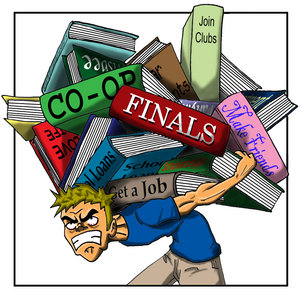Hello. My name is Rebecca Weaver, and I’m an Assistant Professor in the English Department at Georgia State University-Perimeter College, Clarkston Campus.
In the Fall semester, my Honors Composition 1 (ENGL 1101) students at GSU-PC Clarkston studied, wrote, and discussed the genre of college advice. We read examples of advice, as well as a number of articles about the transition to college. In addition to our GSU-PC textbook Successful College Composition, our main text was The Transition To College Writing, by Keith Hjortshoj.
For their research projects, the students created podcasts that explored whether or not to follow certain pieces of advice about college. Through class discussion, we focused our analysis on questions such as: Who is qualified to give it? Who is the audience for this advice? Does it apply to all college students? What mitigating factors change the viability of the advice?
Originally, the assignment invited students to create multimodal projects from their research, rather than a traditional research paper. There were a number of reasons for this. I came to my job at Perimeter from a digital pedagogy post-doc wherein student multimodal projects were the norm, responding to what many in higher education believe is a mandate to train our students in the skills needed for competent communication in the 21st century. These skills must include proficiency in modes of communication beyond the traditional paper, including oral, visual, digital, and electronic media, and their teaching must not be reserved for students only at elite or even four-year universities. In fact, I would argue, one of the most exciting aspects of many digital tools is their ease of access for students from communities underrepresented in many educational institutions. Those of us who teach at schools that serve primarily these communities have a responsibility to smartly and ethically teach best practices for these tools, within the framework of critical and democratic composition pedagogy. As Claire Lutkewitte has argued in her introduction to Multimodal Composition: A Critical Sourcebook, “old and new technologies have enabled, and even demanded, the use of more than one mode to communicate, entertain, solve problems, and engage in deliberation” (1). Communicative tools have always been multimodal, and the explosion of access to digital tools both facilitates and necessitates pedagogical attention to digital literacies. Further, multimodal projects and classes have the potential to engage in deeper rhetorical awareness and focus on process than traditional text-based projects. This not only allows students to contribute to new “ways of knowing,” but also to respond well to “new communicative situations” (6), many of which they will encounter in their future careers (14). Learning and practice extending beyond the semester and classroom is often stated as a pedagogical goal; intentional and thoughtful teaching of multimodal projects can help us achieve that goal.
This particular set of students was open to the challenge of thinking about both the applicability of certain kinds of advice and the access to that advice for its intended audience. As a composition pedagogue, I know that we must always consider our audience. The audience for most college advice tends to be college students, as well as their parents or guardians. But most college students don’t read their student colleagues’ research papers (unless in a peer review context). Many college students are used to communicating in and getting information from multimodal formats.
Therefore, it made sense that we choose a more multimodal format than that of the traditional paper, so that my students’ conclusions would be more accessible to their audience.
The students ended up deciding that they would like to create a podcast series. Each of them wrote and produced an episode that attempted to follow a series of steps we agreed upon in class:
- Introduction of self and advice (and why you chose to investigate it)
- Recommendation to follow or not follow
- Scholarly and other research that supports your argument
- Reiteration of recommendation
- Possible mitigating circumstances
- End
Enjoy!


